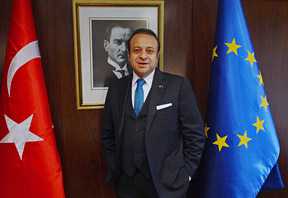By Alakbar Raufoglu for Southeast European Times — 14/03/13

Chief EU negotiator Egemen Bagis at his office in Ankara. Turkey’s quest for EU membership has picked up steam recently. [AFP]
Turkey’s stalled EU candidacy has picked up steam in recent weeks as senior European leaders called for a fresh push for negotiations, drawing positive responses from Ankara.
Turkey began accession talks with the EU in 2005, but progress has stalled. Only 13 of 35 negotiating chapters have been opened, with one completed successfully. No new ones have been opened since 2010. The chapters are areas of policy that Turkey and the EU need to agree on in order for Turkey to become a member.
French President Francois Hollande said last month he was prepared to open talks on the chapter related to EU support for regions within the bloc. His Socialist Party has been more supportive of Turkey’s membership bid than its predecessor.
German Chancellor Angela Merkel also backed fresh talks with Turkey to boost its candidacy, stopping short of endorsing full membership.
“In recent times, negotiations stalled somewhat and I am in favor of opening a new chapter in order to move forward,” Merkel stated in advance of her recent trip to Turkey.
Meanwhile, the draft of Chapter 22 on Regional Policy and Coordination of Structural Instruments has been unofficially sent to EU authorities, according to Egemen Bagis, Turkey’s minister of EU and chief negotiator.
“We are now waiting for the member countries to evaluate it,” state-run Anatolian news Agency quoted Bagis as saying last week.
Abdulkadir Emin Onen, AKP Sanliurfa deputy and the party’s vice chairman for foreign affairs, said the recent statements by France and Germany were “promising.”
“Obviously, we hope and expect the latest statements to have a positive impact on accession negotiations and that not only one, but all the remaining [blocks on the] chapters to come to an end in the near future,” he told SETimes, adding that Ankara’s target remains “full membership.”
Amanda Paul, a Turkey analyst at the Brussels-based European Policy Centre, said a revival in negotiations could strengthen democracy in Turkey.
The deadlock “created a very negative climate” between Ankara and the EU, she said.
“It impacted the reform efforts in Turkey, which slowed and in some cases, [such as] freedom of expression, started to go backwards,” Paul told SETimes.
She added: “Therefore, the decision of the French president to unblock a chapter is to be welcomed, as [is] the positive message of Angela Merkel.”
Kader Sevinc, the CHP’s representative to the EU, told SETimes Brussels “has long been failing to act with strategic vision on Turkey, losing its power of influencing positively Turkey’s democratic reforms and social development.”
As a result, added Sevinc, the Turkish government “has become increasingly authoritarian, exercising pressure on the media, academia, civil society and the judiciary.”
Closer Turkey-EU engagement on democratic standards “would be good news for Turkey’s social democrats and progressive forces represented by the CHP,” Sevinc said.
Deputy Foreign Minister Naci Kuru defended his government’s record on democratisation in a recent speech in Istanbul.
“Naturally, we still have a lot to do to fully meet the democratic aspirations of our people, but there is no doubt that today Turkish democracy serves as a source of inspiration to the wider area surrounding it,” Kuru said, according to media reports.
Analysts were quick to temper the optimism created by the recent movement on Turkey’s EU bid. Challenges remain, they said, citing the unresolved status of Cyprus, European opposition to Turkish membership on non-political grounds, and fading public support for the process in Turkey.
For Paul, what happens next will help clarify whether the EU is serious about “a new beginning with Turkey” or not.
Related Articles
New EU president Cyprus teeters on financial precipice
16/07/2012
Diplomatic Diary: EP president in Cyprus
12/10/2010
Turkish minister clarifies “racism” remarks
04/02/2011
EU considers speeding up Turkish accession talks
14/07/2010
Diplomatic Diary: Merkel discusses controversial issues in Turkey
30/03/2010
“If this is a case of the EU simply trying to put new wine in an old bottle, then this reset may not last long,” Paul told SETimes.
She added that Brussels “needs to develop a genuine long term strategy towards Turkey, not come up with short term solutions for a long term problem which further risks damaging a relationship of significance importance to the EU.”
Swedish Ambassador to Turkey Hakan Akesson said last week that democracy, human rights and superiority of law are “common values of the member countries of the EU and should not be correlated to religion.”
Turkey, he stated in an interview with the Turkish press, “is very close to becoming a member of the EU as it is both financially and economically important for the EU.”
This content was commissioned for SETimes.com.
via Turkey’s EU bid getting back on track (SETimes.com).

Leave a Reply